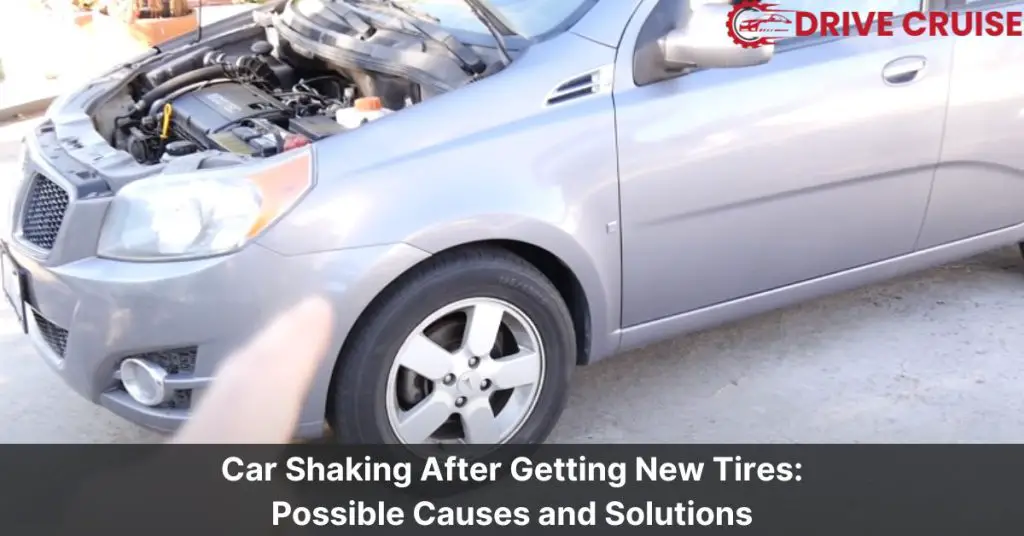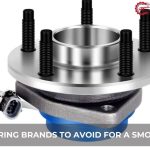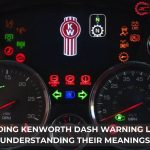Getting new tires can be an exciting experience, especially if you’re a car enthusiast. However, if you’re experiencing a shaking sensation in the steering wheel or throughout the car, it can be a frustrating situation. The shaking can be caused by a variety of factors, including the installation of new tires. Fortunately, this guide will help you diagnose the cause of the shaking and offer tips to ensure a balanced and vibration-free ride on your new rubber.
One of the most common causes of car shaking after getting new tires is unbalanced wheels. When the wheels are not balanced properly, it can cause vibrations that can be felt in the steering wheel or throughout the car. Another potential cause is a bent rim. This issue could have been hidden due to old tires and only surfaced due to new tires. Loose nuts can also make the tire wobbly and cause the car to shake. It’s important to check the basics, such as ensuring all the nuts on the tires are tight, before moving on to more complex troubleshooting steps.
If you’re experiencing shaking after installing new tires, don’t worry. This guide will provide you with the information you need to diagnose the problem and fix it. By following the troubleshooting steps and tips provided, you can ensure a smooth and enjoyable ride on your new tires.
Understanding Tire Balance: The Root of Smooth Rolling
If you’ve recently gotten new tires and you’re experiencing shaking or vibrations while driving, it’s possible that your tires are not properly balanced. A balanced tire is essential for a smooth ride and optimal handling. Here’s a quick refresher on tire balance and why it’s crucial:
What is Tire Balance?
Tire balance refers to the equal distribution of weight around the tire and wheel assembly. An imbalanced tire creates a wobble effect as it spins, causing vibrations that translate into shaking throughout the car. This can be especially noticeable at higher speeds.
How is Tire Balance Achieved?
During a tire installation, small weights are strategically placed on the rim to counteract any weight imbalances in the tire or wheel. This helps to ensure that the tire spins evenly, reducing the risk of vibrations and shaking.
Can New Tires Cause Vibration?
Yes, new tires can cause vibration if they are not properly balanced. In fact, this is a common issue that many drivers experience after getting new tires installed. If you feel like your tire is wobbling at high speeds or your car shakes after getting new tires, it’s important to have your tires checked for balance.
What Should You Do if Your Car Shakes After Getting New Tires?
If you’re experiencing shaking or vibrations after getting new tires, the first step is to have your tires checked for balance. Make sure that all the nuts on the tires are tight, as loose nuts can also cause the tire to wobble and the car to shake. If the issue persists, it’s best to take your car to a trusted mechanic to have it inspected. They can help identify the root cause of the shaking and recommend the best course of action to get your car back to a smooth, safe ride.
The Shaking Suspects: Unveiling the Cause of the Wobble
If you recently got new tires and your car is shaking, it can be a frustrating experience. Several factors can contribute to this issue. In this section, we will discuss the most common suspects and their symptoms.
Imbalanced Tires
Description: This is the most common culprit. Even new tires can have slight weight inconsistencies that require balancing. The balancing process might have been incomplete or improperly performed during installation.
Symptoms: The shaking typically occurs at specific speeds, often worsening as you reach highway speeds (around 60-80 mph). The shaking might be felt in the steering wheel, floorboard, or throughout the car.
If you suspect that your tires are imbalanced, take your car to a reputable mechanic who can perform a tire balance check. They will use specialized equipment to determine if your tires are out of balance. If they are, the mechanic will rebalance them by adding small weights to the wheel to correct the weight distribution.
Improper Lug Nut Tightening
Description: Unevenly or improperly tightened lug nuts can cause a wobble effect similar to an imbalanced tire.
Symptoms: The shaking might be felt at all speeds, and it might be accompanied by a rattling noise from the wheels. It’s crucial to address this issue immediately to prevent potential safety hazards.
If you suspect that your lug nuts are not tightened correctly, stop driving your car and take it to a mechanic immediately. Driving with loose lug nuts can cause the wheel to come off while driving, leading to a severe accident. A mechanic will tighten the lug nuts to the manufacturer’s recommended torque specification to ensure that they are secure.
Underlying Suspension Issues
Description: In some cases, pre-existing suspension problems like worn ball joints, tie rods, or bent wheels can be exacerbated by new tires, causing a shaking sensation.
Symptoms: The shaking might not be limited to a specific speed and could be accompanied by other handling abnormalities like a pulling sensation or abnormal tire wear.
If you suspect that your suspension is causing the shaking, take your car to a mechanic for a suspension check. They will inspect your suspension system and diagnose any issues. Depending on the problem, they might need to replace worn parts or perform an alignment to correct the issue.
Troubleshooting the Wobble: Taking Action for a Smooth Ride
So, you’ve just gotten new tires installed on your car, and now you’re experiencing a wobble or vibration while driving. This can be a frustrating and concerning issue, but don’t worry – there are steps you can take to address it and get back to enjoying a smooth ride.
The first course of action is to return to the tire shop where you had the tires installed and request a rebalance of all four tires. This is a common issue that can occur when new tires are installed, as even small imbalances in weight can cause vibrations at certain speeds. A professional rebalance should correct the issue and restore a smooth ride.
If the rebalance doesn’t resolve the issue, it’s important to ensure that all the lug nuts are tightened to the manufacturer’s recommended torque specifications using a torque wrench. Refer to your car’s owner’s manual for specific torque values. Loose or improperly tightened lug nuts can also cause vibrations and wobbling, so it’s important to double-check this step.
If neither rebalancing nor lug nut checks resolve the issue, it may be time to seek professional help from a qualified mechanic to diagnose any underlying suspension problems. There may be issues with your car’s shocks, struts, or other suspension components that are causing the wobble, and a professional inspection can help pinpoint the issue and provide a solution.
Beyond the Fix: Preventing Shakes for Future Tire Changes
To avoid experiencing the unpleasant shaking of your car after getting new tires, there are some proactive tips you can follow for future tire installations. Here are some of them:
Reputable Tire Shops
Choosing a reputable tire shop with experienced technicians who prioritize proper balancing procedures is crucial to avoid car shaking. Do your research beforehand and find a tire shop with a good reputation in your area. Check their reviews and ask for recommendations from friends or family members who have had positive experiences with tire shops.
Road Force Variation (RFV) Balancing
Consider requesting RFV balancing during installation. This advanced technique can identify and address even minor weight inconsistencies within the tire itself. RFV balancing can help ensure a smoother ride and minimize the risk of car shaking after getting new tires.
Visual Inspection
Before leaving the tire shop, perform a visual inspection of the lug nuts to ensure they are all tightened securely. Loose lug nuts can cause car shaking and even lead to dangerous accidents. Take a few minutes to check that all the lug nuts are tightened to the manufacturer’s specifications.
Conclusion: Shaking-Free Miles Ahead
Congratulations! You have successfully installed new tires on your car. However, if you’re experiencing shaking or vibrations after the installation, don’t worry. It’s a common problem that can be easily fixed.
As we’ve discussed, there are several potential causes of shaking after new tires, including unbalanced wheels, loose nuts, bent rims, and worn suspension components. By checking these factors and following the recommended troubleshooting steps, you can identify and resolve the issue quickly.
Remember to schedule regular tire maintenance, including rotation and balancing, to ensure optimal performance and longevity. Additionally, consider investing in high-quality tires that are designed to provide a smooth and comfortable ride.
Related Posts:
- AC Only Works When Driving: Common Causes and Solutions
- Can You Get a Flat Tire from Hitting a Curb? Exploring the Possibility
- Car Shaking After Getting New Tires: Possible Causes and Solutions
- What Causes Grooves in Brake Rotors? A Brief Explanation
- How Far Can You Go on 0 Miles to Empty? Tips for Stretching Your Fuel Tank
- How Long Will a Whining Differential Last? A Friendly Guide to the Lifespan of Your Car’s Differential
- Mini Cooper Warning Symbols: What They Mean and How to Respond
- Rear Light Failure Warning Light: What You Need to Know
- Side Mirror Turn Signal Not Working: Common Causes and Solutions
- Smelling Antifreeze But No Leaks: What Could Be the Cause?
- Stop Start Not Ready Battery Charging Must Read: Tips for Keeping Your Car Battery Healthy and Charged

















